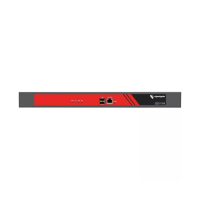Chapter 16: KCS Client Configuration
266 Console Server & RIM Gateway User Manual
ADVANCED CONFIGURATION
Opengear console servers run the embedded Linux operating system. So Administrator class users can configure the
console server and monitor and manage attached serial console and host devices from the command line using Linux
commands and the config utility (as described in Chapter 14).
The Linux kernel in the console server also supports GNU bash shell script enabling the Administrator to run custom
scripts. This chapter presents a number of useful scripts and scripting tools including
- delete-node which is a general script for deleting users, groups, hosts, UPS's etc
- ping-detect which will run specified commands when a specific host stops responding to ping requests
This chapter then details how to perform advanced and custom management tasks using Opengear commands, Linux
commands and the open source tools embedded in the console server:
- portmanager serial port management
- raw data access to the ports and modems
- iptables modifications and updating IP filtering rules
- retrieving status information using SNMP and modifying SNMP with net-snmpd
- public key authenticated SSH communications
- SSL, configuring HTTPS and issuing certificates
- using pmpower for NUT and PowerMan power device management
- using IPMItools
- CDK custom development kit
- sms server tools
- disable multicasting
15.1 Custom Scripting
The console server supports GNU bash shell commands (refer Appendix A) enabling the Administrator to run custom
scripts.
15.1.1 Custom script to run when booting
The /etc/config/rc.local script runs whenever the system boots. By default this script file is empty. You can add any
commands to this file if you want them to be run at boot time e.g. if you wanted to display hello world:
#!/bin/sh
echo "Hello World!"
If this script has been copied from a Windows machine you may need to run the following command on the script before
bash can run it successfully:
# dos2unix /etc/config/rc.local
Another scenario would be to call another custom script from the /etc/config/rc.local file, ensuring that your custom script
will run whenever the system is booted.
15.1.2 Running custom scripts when alerts are triggered
Whenever an alert gets triggered, specific scripts get called. These scripts all reside in /etc/scripts/. Below is a list of the
default scripts that get run for each applicable alert:

